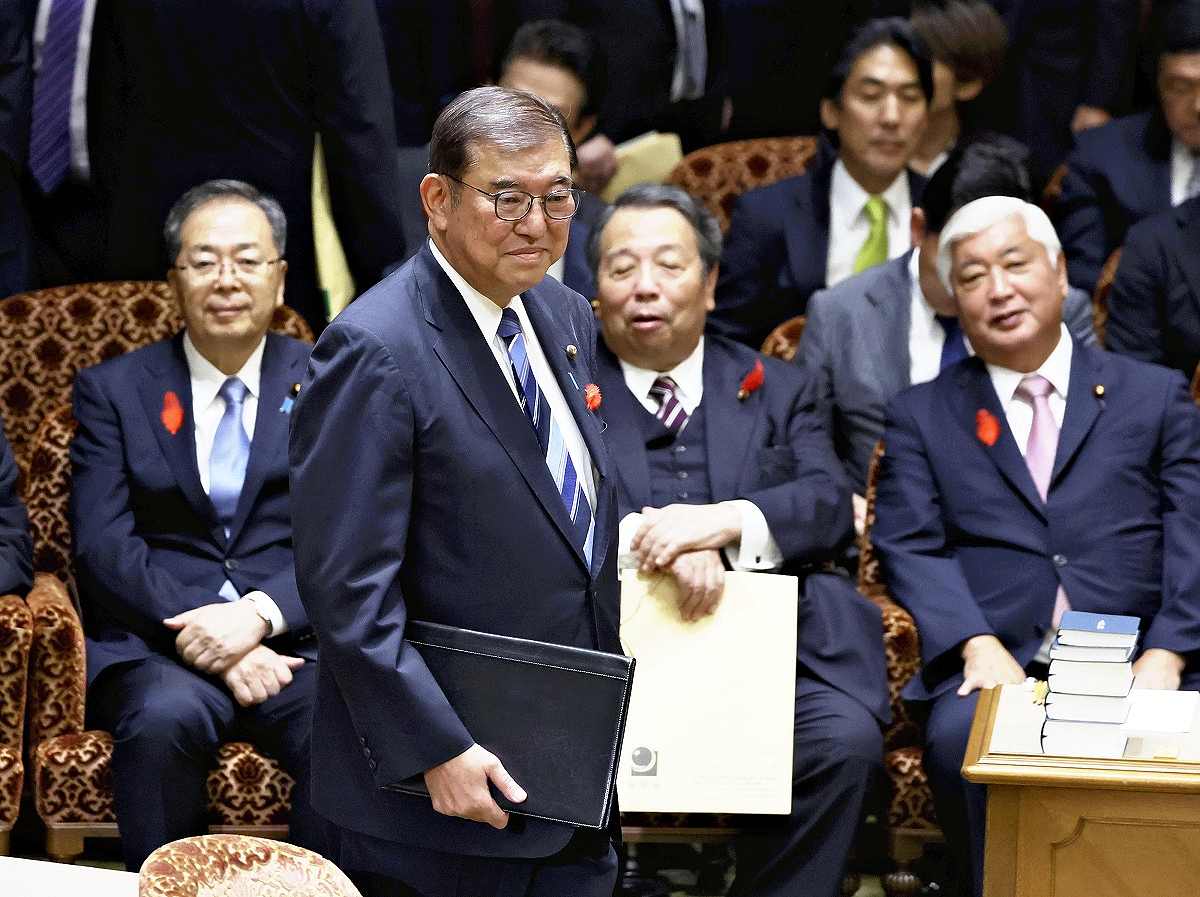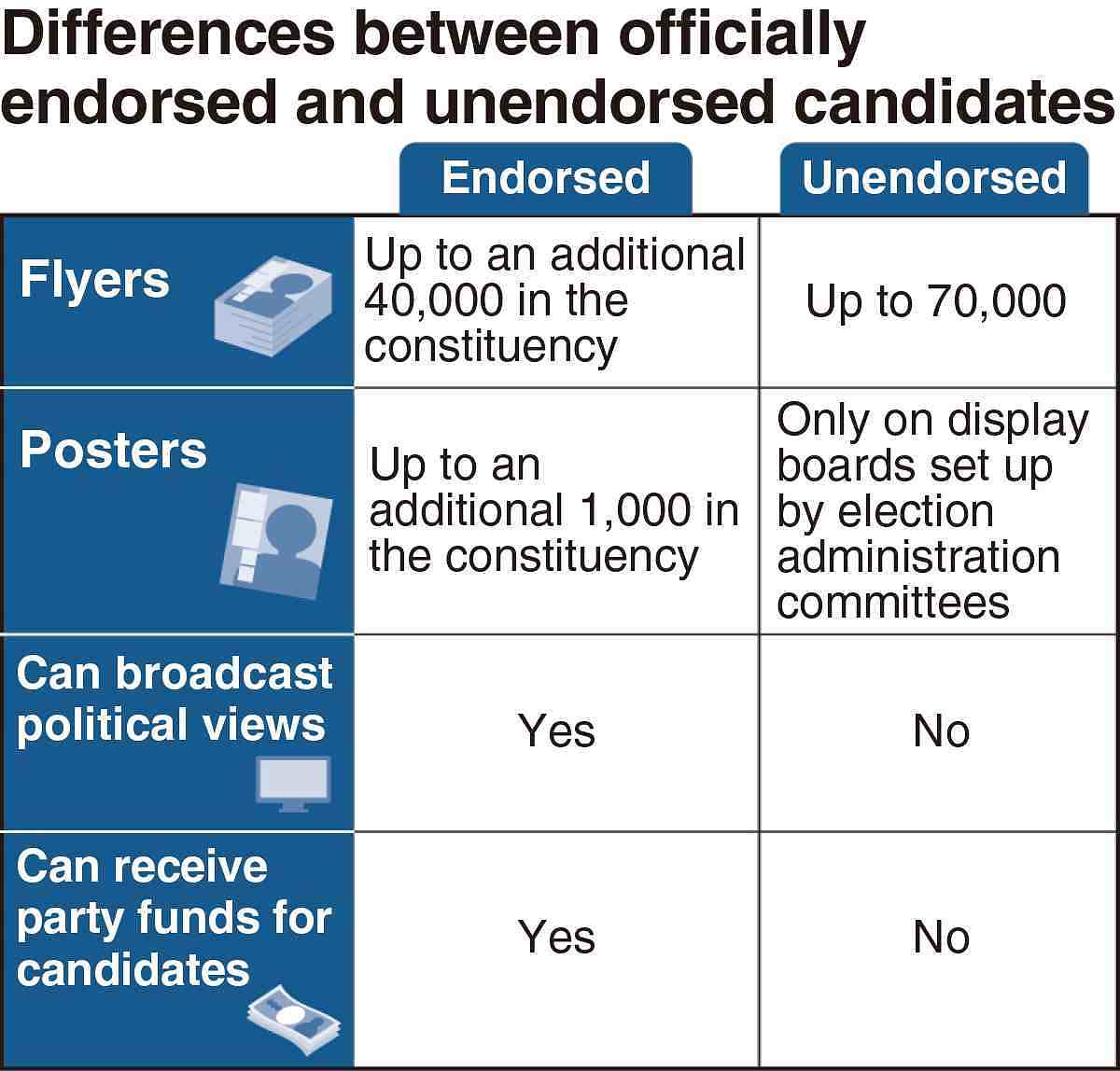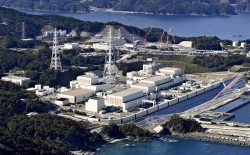Public Discontent Forced Ishiba’s Hand on Endorsements; Unsanctioned Candidates Face Considerable Disadvantages

Prime Minister Shigeru Ishiba during a debate between party leaders in the Diet on Wednesday afternoon
17:08 JST, October 10, 2024
In the end, Prime Minister Shigeru Ishiba could no longer dismiss the criticism.
The public’s anger over the political funds scandal involving factions of the Liberal Democratic Party has rumbled on, stoking fears that the LDP will lose seats in the upcoming House of Representatives election. Ishiba therefore decided Wednesday that 12 scandal-tainted party members would not be endorsed as official LDP candidates.
During a debate between party leaders Wednesday, Constitutional Democratic Party of Japan chief Yoshihiko Noda blasted Ishiba over the fact that only 12 of the lawmakers who failed to record income on their political funds reports would not be endorsed as candidates.
Ishiba expressed mixed feelings over how the situation had unfolded.
“If it were possible, I’d sincerely wanted to seek the public’s approval for my fellow party members,” said Ishiba, who is LDP president. “However, we wouldn’t be able to gain widespread understanding of our position in that case. I’ve felt first-hand just how angry people are about this issue.”
Ishiba initially told his aides that any moves against lawmakers from the former Abe faction and the former Nikai faction “must not become a witch hunt.” The two former factions used to contain many of the Diet members who did not report income, in violation of the Political Funds Control Law. The prime minister was leaning toward a proposal to endorse these members in principle.
However, a survey conducted secretly by the party forced Ishiba to change his mind. The results made it clear that many lawmakers tainted by the scandal were facing uphill battles in their constituencies.
On Saturday, Ishiba met with LDP Secretary General Hiroshi Moriyama and Election Strategy Committee Chairperson Shinjiro Koizumi at party headquarters. During these talks, Moriyama and Koizumi insisted that the matter should be dealt with harshly because the party could not go on as things are.
Ultimately, Ishiba made a decision in line with this view. “I’ll get slammed whatever I do,” Ishiba said. “So if that’s the case, I might as well not hold back.”
Wiping the slate clean
Some LDP members have applauded the decision to withhold the endorsement of 12 lawmakers, but the repercussions have quickly been felt by members of the former Abe faction.
One Cabinet minister said, “It is too lenient of the party not to field other candidates against them. If the candidates return to the Diet after a verdict from the voting public, their slate will have been wiped clean.”
A candidate who has not been endorsed is at a disadvantage in an election campaign. They are allowed to distribute up to 40,000 fewer flyers than an endorsed candidate, and up to 1,000 fewer posters.

In addition, unendorsed candidates are not permitted to participate in broadcasts explaining their political views, and they cannot receive funds that political parties give to authorized candidates. Lawmakers unable to simultaneously run in a single-seat constituency and in the proportional representation segment will immediately be ousted if they are defeated in their single-seat constituency race.
During the leaders’ debate, Ishiba also touched on his own experience of running as an independent candidate. “This decision was made after carefully considering just how tough that was,” Ishiba said.
However, at a meeting of the party’s Election Strategy Headquarters on Wednesday, lower house member Taku Ostuka, a member of the former Abe faction, took a swipe at how the party’s executives had handled the issue. “Some lawmakers are facing a tough situation in their constituency. Is simply cutting some of them off the best way to do things?” Otsuka asked.
Former Environment Minister Akihiro Nishimura, also a member of the faction, met with Moriyama and asked that some assistance be provided to these lawmakers, such as having them approved in the second round of official candidate endorsements. However, Moriyama presented the results of the party survey and did not extend any olive branches.
Lower house lawmaker Kiyoshi Odawara is among the Diet members the LDP decided not to endorse. “I haven’t received any explanation about the reason,” Odawara told reporters at the Diet on Wednesday. “I’ll just do my best to compete in the race up to the very end, get elected and then return here.”
Tough races looming
During the leaders’ debate, Ishiba indicated that candidates who won single-seat constituencies despite not being endorsed by the LDP could later be added as endorsed candidates of the party. This approach apparently was adopted due to projections that these candidates are battling heavy odds in the election.
In 2021, former Prime Minister Fumio Kishida won the LDP presidential election and dissolved the lower house after delivering a policy statement speech and being questioned by representatives of the opposition parties. The LDP won that election, and Ishiba had hoped to repeat the process.
“But the public criticism of the LDP right now is on a completely different scale than what the party faced in 2021,” one observer said, sharing a widely accepted view.
“It’ll be extremely difficult for the LDP to hold the 258 seats it currently has,” a lawmaker who previously was a cabinet minister told The Yomiuri Shimbun. “It’s touch and go whether the LDP will even get a single-party majority [of 233 seats].”
Related Tags
Top Articles in Politics
-

Japan PM Takaichi’s Cabinet Resigns en Masse
-

Sanae Takaichi Elected 105th Prime Minister of Japan; Keeps All Cabinet Appointees from Previous Term
-

Japan’s Govt to Submit Road Map for Growth Strategy in March, PM Takaichi to Announce in Upcoming Policy Speech
-

LDP Wins Historic Landslide Victory
-

LDP Wins Landslide Victory, Secures Single-party Majority; Ruling Coalition with JIP Poised to Secure Over 300 seats (UPDATE 1)
JN ACCESS RANKING
-

Japan PM Takaichi’s Cabinet Resigns en Masse
-

Japan Institute to Use Domestic Commercial Optical Lattice Clock to Set Japan Standard Time
-

Israeli Ambassador to Japan Speaks about Japan’s Role in the Reconstruction of Gaza
-

Man Infected with Measles Reportedly Dined at Restaurant in Tokyo Station
-

Man Infected with Measles May Have Come in Contact with Many People in Tokyo, Went to Store, Restaurant Around When Symptoms Emerged


















